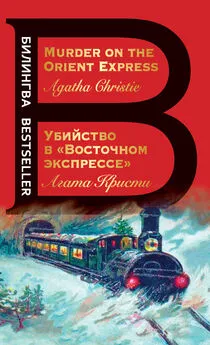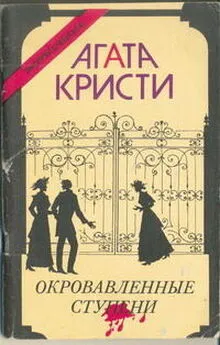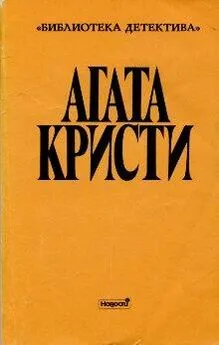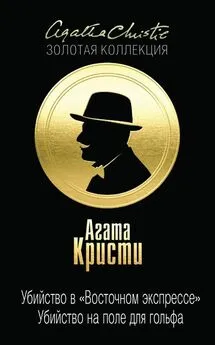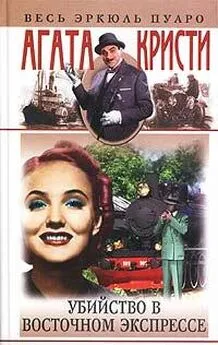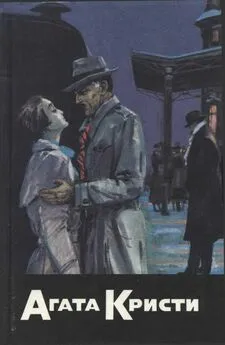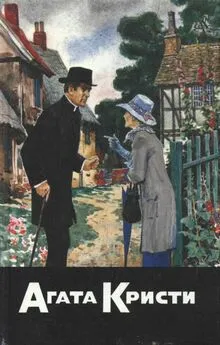Агата Кристи - Убийство в «Восточном экспрессе» / Murder on the Orient Express
- Название:Убийство в «Восточном экспрессе» / Murder on the Orient Express
- Автор:
- Жанр:
- Издательство:Литагент 1 редакция (7)
- Год:1934
- ISBN:978-5-04-114084-7
- Рейтинг:
- Избранное:Добавить в избранное
-
Отзывы:
-
Ваша оценка:
Агата Кристи - Убийство в «Восточном экспрессе» / Murder on the Orient Express краткое содержание
Убийство в «Восточном экспрессе» / Murder on the Orient Express - читать онлайн бесплатно ознакомительный отрывок
Интервал:
Закладка:
She buried her face in her hands.
“What nationality was she, Madame?”
“She was French.”
“What was her last name?”
“It’s absurd, but I can’t remember – we all called her Susanne. A pretty, laughing girl. She was devoted to Daisy.”
“She was the nursery-maid, was she not?”
“Yes.”
“Who was the nurse?”
“She was a trained hospital nurse. Stengelberg her name was. She too was devoted to Daisy – and to my sister.”
“Now, Madame, I want you to think carefully before you answer this question. Have you, since you were on this train, seen anyone that you recognised?”
She stared at him.
“I? No, no one at all.”
“What about Princess Dragomiroff?”
“Oh! her. I know her, of course. I thought you meant anyone – anyone from – from that time.”
“So I did, Madame. Now think carefully. Some years have passed, remember. The person might have altered his or her appearance.”
Helena pondered deeply.
Then she said: “No – I am sure – there is no one.”
“You yourself – you were a young girl at the time – did you have no one to superintend your studies or to look after you?”
“Oh! yes, I had a dragon – a sort of governess to me and secretary to Sonia combined. She was English – or rather Scotch; a big red-haired woman.”
“What was her name?”
“Miss Freebody.”
“Young or old?”
“She seemed frightfully old to me. I suppose she couldn’t have been more than forty. Susanne, of course, used to look after my clothes and maid me.”
“And there were no other inmates of the house?”
“Only servants.”
“And you are certain, quite certain, Madame, that you have recognised no one on the train?”
She replied earnestly: “No one, Monsieur. No one at all.”
Chapter 5
The Christian Name Of Princess Dragomiroff
When the Count and Countess had departed, Poirot looked across at the other two.
“You see,” he said, “we make progress.”
“Excellent work,” said M. Bouc cordially. “On my part, I should never have dreamed of suspecting Count and Countess Andrenyi. I will admit I thought them quite hors de combat. I suppose there is no doubt that she committed the crime? It is rather sad. Still, they will not guillotine her. There are extenuating circumstances. A few years’ imprisonment – that will be all.”
“In fact you are quite certain of her guilt.”
“My dear friend – surely there is no doubt of it? I thought your reassuring manner was only to smooth things over till we are dug out of the snow and the police take charge.”
“You do not believe the Count’s positive assertion – on his word of honor – that his wife is innocent?”
“Mon cher – naturally – what else could he say? He adores his wife. He wants to save her! He tells his lie very well – quite in the grand seigneur manner. But what else than a lie could it be?”
“Well, you know, I had the preposterous idea that it might be the truth.”
“No, no. The handkerchief, remember. The handkerchief clinches the matter.”
“Oh, I am not so sure about the handkerchief. You remember, I always told you that there were two possibilities as to the ownership of the handkerchief.”
“All the same—”
M. Bouc broke off. The door at the end had opened, and Princess Dragomiroff entered the dining-car. She came straight to them and all three men rose to their feet.
She spoke to Poirot, ignoring the others.
“I believe, Monsieur,” she said, “that you have a handkerchief of mine.”
Poirot shot a glance of triumph at the other two.
“Is this it, Madame?” He produced the little square of fine cambric.
“That is it. It has my initial in the corner.”
“But, Madame la Princesse, that is the letter H,” said M. Bouc. “Your Christian name— pardon me – is Natalia.”
She gave him a cold stare.
“That is correct, Monsieur. My handkerchiefs are always initialled in the Russian characters. H is N in Russian.”
M. Bouc was somewhat taken aback. There was something about this indomitable old lady which made him feel flustered and uncomfortable.
“You did not tell us that this handkerchief was yours at the inquiry this morning.”
“You did not ask me,” said the Princess drily.
“Pray be seated, Madame,” said Poirot.
She sighed.
“I may as well, I suppose.” She sat down. “You need not make a long business of this, Messieurs. Your next question will be – How did my handkerchief come to be lying by a murdered man’s body! My reply to that is that I have no idea.”
“You have really no idea?”
“None whatever.”
“You will excuse me, Madame, but how much can we rely upon the truthfulness of your replies?”
Poirot said the words very softly.
Princess Dragomiroff answered contemptuously. “I suppose you mean because I did not tell you that Helena Andrenyi was Mrs. Armstrong’s sister?”
“In fact you deliberately lied to us in the matter.”
“Certainly. I would do the same again. Her mother was my friend. I believe, Messieurs, in loyalty – to one’s friends and one’s family and one’s caste.”
“You do not believe in doing your utmost to further the ends of justice?”
“In this case I consider that justice – strict justice – has been done.”
Poirot leaned forward.
“You see my difficulty, Madame. In this matter of the handkerchief, even, am I to believe you? Or are you shielding your friend’s daughter?”
“Oh! I see what you mean.” Her face broke into a grim smile. “Well, Messieurs, this statement of mine can be easily proved. I will give you the address of the people in Paris who make my handkerchiefs. You have only to show them the one in question and they will inform you that it was made to my order over a year ago. The handkerchief is mine, Messieurs.” She rose. “Have you anything further you wish to ask me?”
“Your maid, Madame, did she recognise this handkerchief when we showed it to her this morning?”
“She must have done so. She saw it and said nothing? Ah, well, that shows that she too can be loyal.”
With a slight inclination of her head she passed out of the dining-car.
“So that was it,” murmured Poirot softly. “I noticed just a trifling hesitation when I asked the maid if she knew to whom the handkerchief belonged. She was uncertain whether or not to admit that it was her mistress’s. But how does that fit in with that strange central idea of mine? Yes, it might well be.”
“Ah!” said M. Bouc with a characteristic gesture. “She is a terrible old lady, that!”
“Could she have murdered Ratchett?” asked Poirot of the doctor.
He shook his head.
“Those blows – the ones delivered with great force penetrating the muscle – never, never could anyone with so frail a physique inflict them.”
“But the feebler ones?”
“The feebler ones, yes.”
“I am thinking,” said Poirot, “of the incident this morning when I said to her that the strength was in her will rather than in her arm. It was in the nature of a trap, that remark. I wanted to see if she would look down at her right or her left arm. She did neither. She looked at them both. But she made a strange reply. She said, ‘No, I have no strength in these. I do not know whether to be sorry or glad.’ A curious remark that. It confirms me in my belief about the crime.”
“It did not settle the point about the left-handedness.”
“No. By the way, did you notice that Count Andrenyi keeps his handkerchief in his right-hand breast pocket?”
M. Bouc shook his head. His mind reverted to the astonishing revelations of the last half-hour.
He murmured: “Lies – and again lies. It amazes me, the number of lies they had told to us this morning.”
“There are more still to discover,” said Poirot cheerfully.
“You think so?”
“I shall be very much disappointed if it is not so.”
“Such duplicity is terrible,” said M. Bouc. “But it seems to please you,” he added reproachfully.
“It has this advantage,” said Poirot. “If you confront anyone who has lied with the truth, he will usually admit it – often out of sheer surprise. It is only necessary to guess right to produce your effect.
“That is the only way to conduct this case.
I select each passenger in turn, consider his or her evidence, and say to myself, ‘If so and so is lying, on what point is he lying, and what is the reason for the lie?’ And I answer, ‘If he is lying – if, you mark – it could only be for such a reason and on such a point.’ We have done that once very successfully with Countess Andrenyi. We shall now proceed to try the same method on several other persons.”
“And supposing, my friend, that your guess happens to be wrong?”
“Then one person, at any rate, will be completely freed from suspicion.”
“Ah! – a process of elimination.”
“Exactly.”
“And whom do we tackle next?”
“We are going to tackle that pukka sahib, Colonel Arbuthnot.”
Chapter 6
A Second Interview With Colonel Arbuthnot
Colonel Arbuthnot was clearly annoyed at being summoned to the dining-car for a second interview. His face wore a most forbidding expression as he sat down and said:
“Well?”
“All my apologies for troubling you a second time,” said Poirot. “But there is still some information that I think you might be able to give us.”
“Indeed? I hardly think so.”
“To begin with, you see this pipe-cleaner?”
“Yes.”
“Is it one of yours?”
“Don’t know. I don’t put a private mark on them, you know.”
“Are you aware, Colonel Arbuthnot, that you are the only man amongst the passengers in the Stamboul – Calais carriage who smokes a pipe?”
“In that case it probably is one of mine.”
“Do you know where it was found?”
“Not the least idea.”
“It was found by the body of the murdered man.”
Colonel Arbuthnot raised his eyebrows.
“Can you tell us, Colonel Arbuthnot, how it is likely to have got there?”
“If you mean, did I drop it there myself, no, I didn’t.”
“Did you go into Mr. Ratchett’s compartment at any time?”
“I never even spoke to the man.”
“You never spoke to him and you did not murder him?”
The colonel’s eyebrows went up again sardonically.
“If I had, I should hardly be likely to acquaint you with the fact. As a matter of fact I didn’t murder the fellow.”
“Ah, well,” murmured Poirot. “It is of no consequence.”
“I beg your pardon?”
“I said that it was of no consequence.”
“Oh!” Arbuthnot looked taken aback. He eyed Poirot uneasily.
“Because, you see,” continued the little man, “the pipe-cleaner, it is of no importance. I can myself think of eleven other excellent explanations of its presence.”
Arbuthnot stared at him.
“What I really wished to see you about was quite another matter,” went on Poirot. “Miss Debenham may have told you, perhaps, that I overheard some words spoken to you at the station of Konya?”
Arbuthnot did not reply.
“She said, ‘Not now. When it’s all over. When it’s behind us!’ Do you know to what those words referred?”
“I am sorry, M. Poirot, but I must refuse to answer that question.”
“Pourquoi?”
The Colonel said stiffly, “I suggest that you ask Miss Debenham herself for the meaning of those words.”
Читать дальшеИнтервал:
Закладка:
